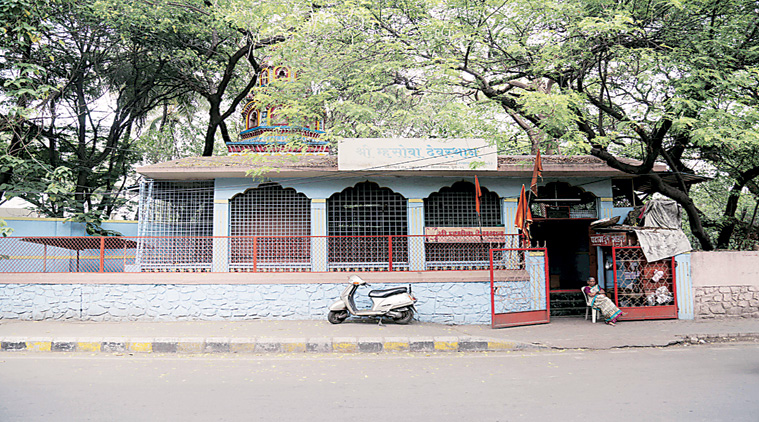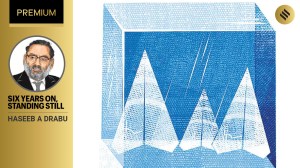The riddle of Mhatoba, Mhaskoba and Mahishasura
Datar said Mhasoba is mainly identified in villages of Maharashtra as a khestrpal (kshetrapal- guardian) deity and is worshipped by villagers, especially farmers throughout the year.
 Mhasoba temple at Shivajinagar. Digvijay Sabne
Mhasoba temple at Shivajinagar. Digvijay Sabne
PERCHED atop a small hillock overlooking the glass facade buildings of the Rajiv Gandhi IT Park, the Mhatoba temple in Hinjewadi receives a steady stream of visitors throughout the year. Mostly consisting of local residents, devotees here swear by the grace of Mhatoba in their daily lives. “I come here every morning to pay my respects, Mhatoba always hears my prayers,” said Ram Kadam, a resident of Wakad. Eminent Marxist historian DD Kosambi, in his book Myth and Reality, alleges that the horned buffalo deity Mhasoba, which he says is another name for Mhatoba, is the same as the buffalo-deity Mahishasura who was slain by the goddess Durga. Kadam, who says his family has been visiting the temple regularly for generations, has never head of this connection. “I do not know anything about it,” he said.
The veneration of Mhaskoba, Mhatoba and Mhasoba has been going on for centuries in Maharashtra. They are tribal gods popular across sections of society. While the worship of Mahishasura in North India is popular among certain tribes, and is used as a symbol of tribal pride, the followers of Mhatoba, who may or may not be Mahishasura, venerate him for alleviation of the trials and tribulations of their day-to-day life. A pastoral god, venerated across Maharashtra, aniconic (symbolic or suggestive) shrines of the deity dot the length and breadth of the state. Once associated with the Dhangar (nomadic herdsman) community, according to Saili Palande Datar, Indologist and researcher with Pune-based Samvidya Institute of Cultural Studies, the deity has now been incorporated with the pantheon of village deities (Gram Daivata). Datar says shrines of Mhasoba are situated near temples of the goddess. “The best example is in Pune where a live Mhasoba cult is to be seen at the foot of the Parvati hill temple,” Kosambi’s book states. However, that was the only instance the book gave of a Mhasoba temple situated near a Parvati temple.
Datar said Mhasoba is mainly identified in villages of Maharashtra as a khestrpal (kshetrapal- guardian) deity and is worshipped by villagers, especially farmers throughout the year. “He is offered hen or goat as a sacrifice,” she said. Majority of the Mhasoba temples can be seen at village crossroads, with mostly non-Brahmin priests serving in the temple. She also said that Mhasoba in folk culture is considered to be the guardian brother of the seven river goddesses termed as Sati-Asara.
Mythical stories are, many times, composed to justify assimilation of communities worshipping different deities in greater Hindu pantheon, Datar said. “Sometimes, folk or regional deities are also identified as aspects of Shaiva, Shakti or Vaishnav pantheon,” she said.
Historian GB Deglulkar said, “The state has a long history of worship of Durga as Mahishasuramardini as evident from the image worshipped at the Tuljapur temple,” he said.
Sanjay Jambhulkar, trustee of the Hinjewadi-based Mhatoba temple, said he was unaware of any similarity between Mhatoba and Mahishasura. “We have heard from our elders about the glory of the temple and we continue the traditional method of worship,” he said.













